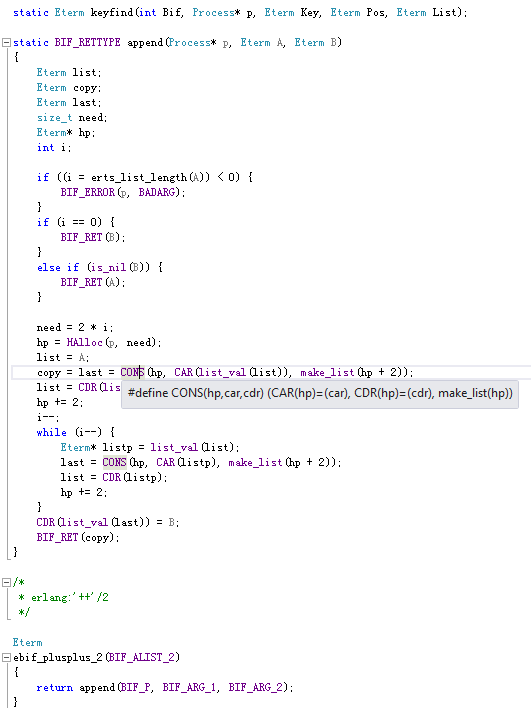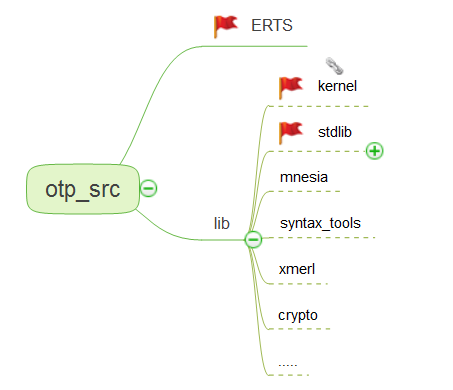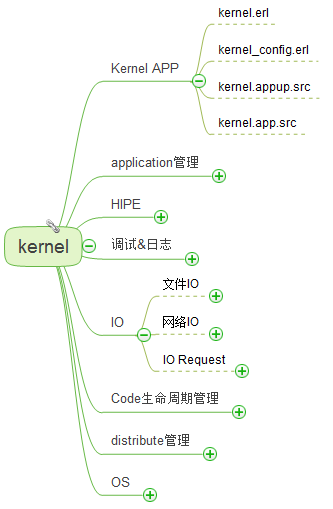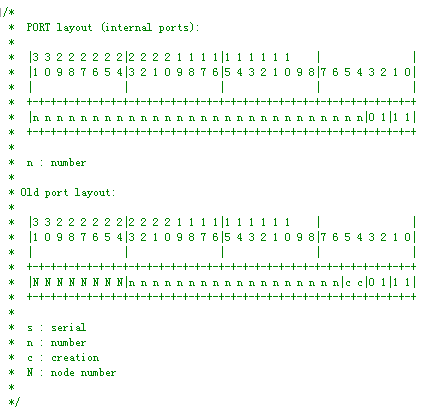上周Erlang讨论群里面提到lists的++实现,争论大多基于猜测,其实打开代码看一下就都明了.贴出代码截图后有同学问这代码是哪里找的?
"代码去哪里找?",关于Erlang源码阅读的路线图江湖上只有一份残卷了.我觉得"代码在哪儿?"这类问题是信息不对称造成的,本身难度不大,就像<贫民窟的百万富翁>里面的情节:贾马尔知道市井生活中的零零碎碎却说不出国徽上的文字,我们就从电影中的这一幕开始本文的探索吧
内景,演播室—夜晚
普瑞姆:这个问题的奖金四千卢比……印度的国徽是三只狮子,狮子下面写的是什么?是否是……
A.惟有真理必胜 B.惟有谎言必胜 C.惟有时尚必胜 D.惟有金钱必胜
A.惟有真理必胜 B.惟有谎言必胜 C.惟有时尚必胜 D.惟有金钱必胜
[普瑞姆假装困惑的样子看向观众,引他们发笑.]
普瑞姆:你觉得是哪一个呢,贾马尔?这是我国历史上最著名的一句话.或许你想给朋友打电话求助吧?
[观众哈哈大笑.一滴汗珠从贾马尔的额头流下来.普瑞姆喜欢贾马尔的不安.]
[观众哈哈大笑.一滴汗珠从贾马尔的额头流下来.普瑞姆喜欢贾马尔的不安.]
普瑞姆:或者向现场观众求助?我凭直觉认为他们可能知道答案.你想怎么办?
贾马尔:是的.
普瑞姆(吃惊):什么是的?
贾马尔:求助观众.
[普瑞姆吹口哨.举目望向观众席.]
普瑞姆:那么女士们、先生们,请帮他解难吧.现在请按下你们的选择键.
[灯光转暗.让人紧张的音乐声响起.]
贾马尔:是的.
普瑞姆(吃惊):什么是的?
贾马尔:求助观众.
[普瑞姆吹口哨.举目望向观众席.]
普瑞姆:那么女士们、先生们,请帮他解难吧.现在请按下你们的选择键.
[灯光转暗.让人紧张的音乐声响起.]
内景,督察办公室—白天
[督察按暂停键.叹了口气.]
督察:贾马尔,我五岁大的女儿都知道答案,你却不知道.这对一个天才百万富翁来说,不是很奇怪吗?怎么回事?你的作弊同伙跑出去撒尿了是吗?又或者是他咳得不够大声?
[沉默.斯里尼瓦斯警员朝贾马尔的椅子踢了一脚.]
斯里尼瓦斯警员:督察问你话呢.
贾马尔:在乔帕蒂海滩吉万的小吃摊上,炸脆饼多少钱?
督察:什么?
贾马尔:一份炸脆饼,多少钱?
斯里尼瓦斯警员(忍不住说):十卢比.
贾马尔:错.排灯节过后就是十五卢比了.上个星期四,是谁在达达尔车站外面偷了瓦尔马警员的自行车?
督察(被逗乐了):你知道是谁偷的?
贾马尔:朱胡区的每个人都知道.连五岁的小孩儿都知道.
言归正传,我们从代码下载开始......
源码下载
Github地址: https://github.com/erlang/otp
对于选择了Windows安装包的同学,要特别提示一下:lib目录中包含了对应类库的源码和ebin,比如kernel,stdlib等等,但ERTS目录里面没有对应源码,自己去下载一份来看吧,或者直接在线查看 https://github.com/erlang/otp/tree/maint/erts
源码阅读工具
Erlang OTP源码量不小,好的工具能帮我们省很多事,比如支持文件夹查找或者项目内搜索的,在代码之间各种跳转更是减少很多麻烦.如果是在Windows环境中Everything这样的工具也是定位文件利器,Visual studio 阅读C代码体验真的很棒,当然了如果你喜欢在纯文本编辑器里面用正则搞,也无不可;下面是在VS中代码截图:

Overview
大体上,otp_src的代码如下图这样组织的(打开文件夹就可以看到,算不上什么Thirty Thousand Feet).与我们每天写代码最息息相关的是ERTS和lib;ERTS(Erlang Run-Time System)包含了Erlang运行时系统的代码,是Erlang的基础设施.lib包含了所有的外围类库实现,有些类库的安排是违反直觉的,不过习惯了就好了,比如file.erl不是在stdlib而是在kernel;gen_server gen_fsm的代码实现应该是在kernel吧?错,它们的代码是在stdlib下;但是呢,application.erl是在kernel.

Kernel
看一下kernel目录,是不是有点摸不着头脑?Erlang运行时是有一个kernel application运行,运行一下appmon我们可以动态看到kernel涉及到的代码模块.我们大致可以揣摩到设计者的规划原则:kernel的范畴包含了application管理,code生命周期管理,IO(文件IO,网络IO,io_request),HIPE,分布式基础设施等等,见下面的思维导图:


上面的划分方式只是我个人的一种看法,为了方便查阅我把上图转成了文字,见下面:
Kernel Kernel APP kernel.erl kernel_config.erl kernel.appup.src kernel.app.src application管理 application_controller.erl application_starter.erl application_master.hrl application_master.erl application.erl heart.erl HIPE hipe_ext_format.hrl hipe_unified_loader.erl 调试& 日志 日志 disk_log.erl disk_log_sup.erl disk_log_server.erl disk_log_1.erl disk_log.hrl error_logger.erl wrap_log_reader.erl 调试 error_handler.erl erts_debug.erl standard_error.erl seq_trace.erl IO 文件IO file.erl file_server.erl file_io_server.erl ram_file.erl 网络IO gen_sctp.erl gen_udp.erl gen_tcp.erl inet.erl inet_config.hrl inet_config.erl inet_boot.hrl inet6_udp.erl inet6_tcp_dist.erl inet6_tcp.erl inet6_sctp.erl inet_db.erl inet_dns.hrl inet_dns.erl inet_gethost_native.erl inet_udp.erl inet_tcp_dist.erl inet_tcp.erl inet_sctp.erl inet_res.hrl inet_res.erl inet_parse.erl inet_int.hrl inet_hosts.erl inet_dns_record_adts.pl erl_reply.erl net_kernel.erl net_adm.erl net.erl IO Request user_drv.erl user.erl user_sup.erl group.erl Code生命周期管理 code.erl code_server.erl erl_boot_server.erl erl_ddll.erl distribute管理 dist_util.erl dist_ac.erl Distributed Applications Controller erl_distribution.erl erl_epmd.erl rpc.erl pg2.erl global_search.erl global_group.erl global.erl auth.erl OS os.erl
stdlib
相比kernel,stdlib恰如起名包含了绝大多数的功能模块,比如lists,ets,各种数据结构实现,当然最重要的是它包含了OTP的gen_server gen_fsm gen_event supervisor以及幕后英雄proc_lib和sys.如果你不嫌弃,这里有一份略微过时的文档,是我初学Erlang的时候在文档上做的笔记注释:[Erlang STDLIB 中文注释版]

特别值得一提的是shell和shell_default,对Erlang Shell好奇的同学看看这里能找到答案,所谓"EShell里面灵异的问题"也就有了一个合理的解释.
其它的模块因为功能特别明确很容易定位到,比如专门处理XML的xmerl,数据库mnesia等等,辅之以Google,几乎没有什么障碍;
Dive into ERTS
Atom and bifs
atom.names 枚举了ERTS使用的atom,学习一下惯用法还是非常有必要的
bif.tab bif清单 注意 Use "ubif" for guard BIFs and operators; use "bif" for ordinary BIFs.
Basic Type
/* ** Data types: ** ** Eterm: A tagged erlang term (possibly 64 bits) ** BeamInstr: A beam code instruction unit, possibly larger than Eterm, not smaller. ** UInt: An unsigned integer exactly as large as an Eterm. ** SInt: A signed integer exactly as large as an eterm and therefor large ** enough to hold the return value of the signed_val() macro. ** UWord: An unsigned integer at least as large as a void * and also as large ** or larger than an Eterm ** SWord: A signed integer at least as large as a void * and also as large ** or larger than an Eterm ** Uint32: An unsigned integer of 32 bits exactly ** Sint32: A signed integer of 32 bits exactly ** Uint16: An unsigned integer of 16 bits exactly ** Sint16: A signed integer of 16 bits exactly. */
Erlang Term的构造代码在: https://github.com/erlang/otp/blob/maint/erts/emulator/beam/erl_term.h
这里我们还能看到一些复杂数据结构的内部表示,比如:

两个例子
看两个例子吧,第一个例子lists的append是如何实现的,很容易找到lists.erl
append(L1, L2) -> L1 ++ L2.
我们发现其实append就是使用的++,那++是在哪里实现的呢?
在 https://github.com/erlang/otp/tree/maint/erts/emulator/beam 目录下面,可以看到一系列erl_bif_*.c的文件,这里可以找到对应模块的bif实现.打开
https://github.com/erlang/otp/blob/maint/erts/emulator/beam/erl_bif_lists.c 是不是很快就找到我们想要的代码了?对,就是我上面截图的代码,这里不再重述.
比较有趣的一个地方是这两句:
copy = last = CONS(hp, CAR(list_val(list)), make_list(hp + 2));
list = CDR(list_val(list));
有同学说,CAR CDR CONS这三个东西好熟悉啊?对,没错,这就是Lisp列表操作的三个基础原语,分别实现取表头,取表头外剩余部分,表构造(constructs),跳转到它们的实现,在erl_term.h:
#define CONS(hp, car, cdr) \
(CAR(hp)=(car), CDR(hp)=(cdr), make_list(hp))
#define CAR(x) ((x)[0])
#define CDR(x) ((x)[1])
第二个例子 看看process的定义是什么样的
首先在 erl_process.h 找到 Process的定义
typedef struct process Process;
转到struct process的定义:
struct process {
ErtsPTabElementCommon common; /* *Need* to be first in struct */
/* All fields in the PCB that differs between different heap
* architectures, have been moved to the end of this struct to
* make sure that as few offsets as possible differ. Different
* offsets between memory architectures in this struct, means that
* native code have to use functions instead of constants.
*/
Eterm* htop; /* Heap top */
Eterm* stop; /* Stack top */
Eterm* heap; /* Heap start */
Eterm* hend; /* Heap end */
Uint heap_sz; /* Size of heap in words */
Uint min_heap_size; /* Minimum size of heap (in words). */
Uint min_vheap_size; /* Minimum size of virtual heap (in words). */
#if !defined(NO_FPE_SIGNALS) || defined(HIPE)
volatile unsigned long fp_exception;
#endif
#ifdef HIPE
/* HiPE-specific process fields. Put it early in struct process,
to enable smaller & faster addressing modes on the x86. */
struct hipe_process_state hipe;
#endif
/*
* Saved x registers.
*/
Uint arity; /* Number of live argument registers (only valid
* when process is *not* running).
*/
Eterm* arg_reg; /* Pointer to argument registers. */
unsigned max_arg_reg; /* Maximum number of argument registers available. */
Eterm def_arg_reg[6]; /* Default array for argument registers. */
BeamInstr* cp; /* (untagged) Continuation pointer (for threaded code). */
BeamInstr* i; /* Program counter for threaded code. */
Sint catches; /* Number of catches on stack */
Sint fcalls; /*
* Number of reductions left to execute.
* Only valid for the current process.
*/
Uint32 rcount; /* suspend count */
int schedule_count; /* Times left to reschedule a low prio process */
Uint reds; /* No of reductions for this process */
Eterm group_leader; /* Pid in charge
(can be boxed) */
Uint flags; /* Trap exit, etc (no trace flags anymore) */
Eterm fvalue; /* Exit & Throw value (failure reason) */
Uint freason; /* Reason for detected failure */
Eterm ftrace; /* Latest exception stack trace dump */
Process *next; /* Pointer to next process in run queue */
struct ErtsNodesMonitor_ *nodes_monitors;
ErtsSuspendMonitor *suspend_monitors; /* Processes suspended by
this process via
erlang:suspend_process/1 */
ErlMessageQueue msg; /* Message queue */
union {
ErtsBifTimer *bif_timers; /* Bif timers aiming at this process */
void *terminate;
} u;
ProcDict *dictionary; /* Process dictionary, may be NULL */
Uint seq_trace_clock;
Uint seq_trace_lastcnt;
Eterm seq_trace_token; /* Sequential trace token (tuple size 5 see below) */
#ifdef USE_VM_PROBES
Eterm dt_utag; /* Place to store the dynamc trace user tag */
Uint dt_utag_flags; /* flag field for the dt_utag */
#endif
BeamInstr initial[3]; /* Initial module(0), function(1), arity(2), often used instead
of pointer to funcinfo instruction, hence the BeamInstr datatype */
BeamInstr* current; /* Current Erlang function, part of the funcinfo:
* module(0), function(1), arity(2)
* (module and functions are tagged atoms;
* arity an untagged integer). BeamInstr * because it references code
*/
/*
* Information mainly for post-mortem use (erl crash dump).
*/
Eterm parent; /* Pid of process that created this process. */
erts_approx_time_t approx_started; /* Time when started. */
/* This is the place, where all fields that differs between memory
* architectures, have gone to.
*/
Eterm *high_water;
Eterm *old_hend; /* Heap pointers for generational GC. */
Eterm *old_htop;
Eterm *old_heap;
Uint16 gen_gcs; /* Number of (minor) generational GCs. */
Uint16 max_gen_gcs; /* Max minor gen GCs before fullsweep. */
ErlOffHeap off_heap; /* Off-heap data updated by copy_struct(). */
ErlHeapFragment* mbuf; /* Pointer to message buffer list */
Uint mbuf_sz; /* Size of all message buffers */
ErtsPSD *psd; /* Rarely used process specific data */
Uint64 bin_vheap_sz; /* Virtual heap block size for binaries */
Uint64 bin_vheap_mature; /* Virtual heap block size for binaries */
Uint64 bin_old_vheap_sz; /* Virtual old heap block size for binaries */
Uint64 bin_old_vheap; /* Virtual old heap size for binaries */
ErtsProcSysTaskQs *sys_task_qs;
erts_smp_atomic32_t state; /* Process state flags (see ERTS_PSFLG_*) */
#ifdef ERTS_SMP
ErlMessageInQueue msg_inq;
ErtsPendExit pending_exit;
erts_proc_lock_t lock;
ErtsSchedulerData *scheduler_data;
Eterm suspendee;
ErtsPendingSuspend *pending_suspenders;
erts_smp_atomic_t run_queue;
#ifdef HIPE
struct hipe_process_state_smp hipe_smp;
#endif
#endif
#ifdef CHECK_FOR_HOLES
Eterm* last_htop; /* No need to scan the heap below this point. */
ErlHeapFragment* last_mbuf; /* No need to scan beyond this mbuf. */
#endif
#ifdef DEBUG
Eterm* last_old_htop; /*
* No need to scan the old heap below this point
* when looking for invalid pointers into the new heap or
* heap fragments.
*/
#endif
#ifdef FORCE_HEAP_FRAGS
Uint space_verified; /* Avoid HAlloc forcing heap fragments when */
Eterm* space_verified_from; /* we rely on available heap space (TestHeap) */
#endif
};
庄子说:"吾生也有涯,而知也无涯.以有涯随无涯,殆已!",所以各取所需就好,今天就到这里,且行且珍惜吧
[0] Routemap source tree https://github.com/erlang/otp/wiki/Routemap-source-tree
[1] A GUIDE TO THE ERLANG SOURCE https://erlangcentral.org/wiki/index.php/A_Guide_To_The_Erlang_Source






